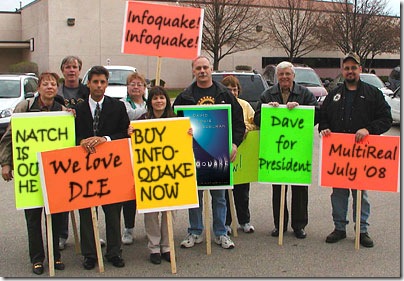As my previous coupla-sentence blog post sorta indicated, I’m hella pleased to be nominated for the Campbell Award for Best New SF/F Writer. In case you’re stumbling across my blog for the first time, um, hey there. I’m the author of Infoquake and the soon-to-be-released MultiReal. But wait! Before you click on either of those links, allow me to say some good words about my fellow nominees.
I read on somebody’s blog this afternoon that Scott Lynch would “win in a walk.” Between you and me, I’m expecting he’ll win the Campbell this year too, but at least I want to make him sprint for it a little. I haven’t heard a bad word about his Lies of Locke Lamora (except from me) or the follow-up, Red Seas Under Red Skies. I dunno, given that he’s the Hot New Fantasy Author on the block and everyone I know universally acknowledges him to be a great guy, there must be something wrong with him.
 I met Jon Armstrong at World Fantasy this year, and I have read his debut novel Grey. It does share a number of thematic concerns with my own Infoquake — economics, rampant consumerism, class discrepancies — and it’s quite funny to boot. The book got one of the best advance blurbs I’ve ever seen from the inimitable Michael Chabon: “Jon Armstrong is a genius, with an umlaut, to the fifth power.” On a personal level, my impression of Jon (sorry, Jön) is that he’s a much, much nicer person than me, though that may be damning him with faint praise.
I met Jon Armstrong at World Fantasy this year, and I have read his debut novel Grey. It does share a number of thematic concerns with my own Infoquake — economics, rampant consumerism, class discrepancies — and it’s quite funny to boot. The book got one of the best advance blurbs I’ve ever seen from the inimitable Michael Chabon: “Jon Armstrong is a genius, with an umlaut, to the fifth power.” On a personal level, my impression of Jon (sorry, Jön) is that he’s a much, much nicer person than me, though that may be damning him with faint praise.
I haven’t met David Anthony Durham yet, but his name seems to crop up quite a bit these days as a fantasist to watch. He’s already got a solid foothold in Respectable Lit’rary Territory with his historical novels Gabriel’s Story, Walk Through Darkness, and Pride of Carthage. A vote for David might be a solid strategic move if only because it will put another dent in the armor of the snooty academics who look down on genre fiction.
I would be very, very pleased to see Mary Robinette Kowal walk off with the Campbell tiara. And not just because she’s smart, she’s my friend, she’s got a story in George Mann’s new Solaris anthology with me, she’s got a highly original voice (in both the literary and literal senses), and she’s dead sexy. She’s also the only nominated author this year with no published novel under her belt. C’mon, big New York publishers, what are you waiting for? Make this gal famous already so we can start our own cool, edgy, avant-garde writers’ movement.
My fellow Pyr novelist Joe Abercrombie stands a good chance of staging an upset win this year for his The Blade Itself and Before They Are Hanged. I’ll confess I haven’t gotten around to reading them yet, but the adjectives that get tossed around about this guy’s work are enough to make anyone jealous. Plus he has a highly entertaining blog. You know, on second thought, please help me bury Abercrombie’s work in obscurity before he totally reinvents the genre out from under the rest of us.

 I had an ulterior motive for attending. I’m in the process of evaluating promotional ideas for my upcoming novel
I had an ulterior motive for attending. I’m in the process of evaluating promotional ideas for my upcoming novel